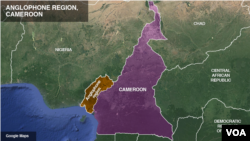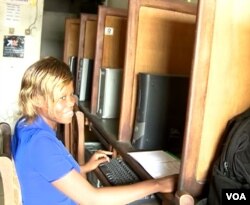The government of Cameroon has restored the internet to the country's two English-speaking regions after a three-month blackout, but it is unclear whether the move will be enough to restart dialogue to end the unrest that began in November.
Abeng Sylvan moved his roadside cyber cafe to Yaounde from Bamenda when the internet was cut in the northwest. The connection was restored late Thursday.
"I was almost losing hope," Sylvan said. "Paying my rents and all the light bills was really difficult. … But when I heard it came, I was very happy."
But he may have to wait to move his business home.
Cameroon government spokesperson Issa Tchiroma Bakary says the internet is being reinstated gradually to the two English-speaking regions, the northwest and the southeast.
The internet was cut in January following violent unrest related to an ongoing strike. The government said the strikers were using social media to spread secessionist and anti-government messages.
The minister of post and telecommunication, Libom Lili Keng, says although service is back, controls will be intensified.
She says the government is equipped to control internet use, and Cameroon's security forces have platforms to track and control people — just as is done in all other countries. She added that Cameroonians should not abuse social media.
Restoring the internet is one of three conditions posed by the organizers of the six-month strike before they will resume dialogue with the government.
The other conditions are that all people arrested in relation to the strike be released unconditionally, and that the state withdraw the soldiers deployed to English-speaking zones since the start of the strike. The government has given no indication it will make concessions on either demand.
But Che David of cameroon.net, a security surveillance enterprise that had to relocate to Yaounde during the blackout, says restoring the internet is a start.
"To me, it is a bold step that the government has taken to solve the problem," he said. "You know, the people were cut off and they knew they were not part of la Republique Du Cameroun. But now that the internet has been given back to them, they feel involved. They feel being citizens in a country."
The unrest began in November when anglophone teachers and lawyers in the two affected areas went on strike, calling for reforms to address what they say is the marginalization of English in the bilingual country.
Last week, the U.N. secretary-general's special representative to Central Africa, Francois Lonseny Fall, visited Cameroon. He called for frank dialogue to address the long-standing tensions. The U.N. official also called on the government to reinstate the internet and release the detainees.






